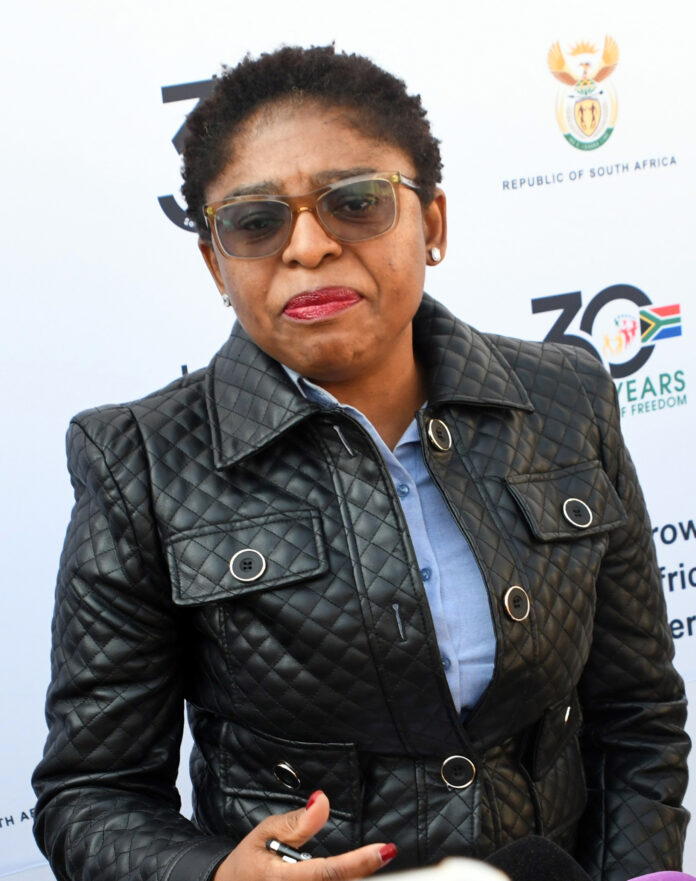The Walter & Albertina Sisulu Foundation for Social Justice has issued a scathing statement condemning Minister in the Presidency Khumbudzo Ntshavheni for her recent remarks in Parliament regarding “potential coup risks” in South Africa.
According to the foundation, Ntshavheni’s comments are “deeply irresponsible, dangerous, and, in the current political climate, reckless in the extreme”.
Multiple risks, but SA is safe
The minister claimed that the country’s security services had detected multiple coup risks. But she insisted that South Africa remains secure.
However, the foundation condemned the lack of evidence, public briefing, or accountability in Ntshavheni’s statement. It said the statement “verges on fearmongering by executive design”.
The statement, issued from the foundation’s offices in Linden, Randburg, drew attention to the context in which Ntshavheni’s comments were made, highlighting the recent suspension of Police Minister Senzo Mchunu.
According to the foundation, Mchunu—a key ally of President Cyril Ramaphosa—was suspended after KZN police commissioner Nhlanhla Mkhwanazi “bravely revealed a web of collusion between police leadership, political elites, and organised criminal syndicates”.
Diversion from real issues
“Instead of responding with clarity, urgency, or reform, the government has done what it increasingly does when under pressure: create a diversion, and what better distraction than the spectre of a coup?” the statement continued.
The foundation warned that coup threats “are not political tools. They are serious constitutional matters that require transparency, accountability, and responsible public communication. Especially in a country still grappling with inequality, high unemployment, community unrest, and deepening mistrust of state institutions”.
The organisation further cautioned that “for a senior cabinet minister to casually mention “potential coup risks” without any supporting detail or national security updates risks undermining both investor confidence and national cohesion.
It incites fear, it breeds suspicion. “It projects instability, even where none may exist. And it reinforces the worst fears of many: that this administration is willing to play loose with facts, weaponise paranoia, and erode democratic norms in a transparent but dangerous attempt to manage internal political fallout.”
Citizens’ trust collapsing
The foundation questioned the timing of Ntshavheni’s remarks, stating, “The timing of Ntshavheni’s statement is damning. It arrives just as public scrutiny of the president’s handling of the police crisis reaches fever pitch.
“The appointment of a non-MP acting police minister (within his powers), the creation of yet another judicial commission (the fifth of his presidency), and the president’s silence on Phala Phala have already enraged citizens. No wonder trust is collapsing.”
The foundation described Ntshavheni’s claims as “a classic deflection tactic. “To distract public and parliamentary attention from real accountability questions. Instead of answers, we get an unverified claim of a coup attempt, floated in the most public forum of the land. Then immediately dropped with no follow-up.”
Gaslighting South Africans
“This is not governance. It’s governance by gaslight. And most disturbing of all, a disdainful display of continued disrespect for the South African people,” the statement said.
The Foundation also raised concerns that, through her “vague and ominous language, unaccompanied by evidence or clarification,” minister Ntshavheni’s remarks could feed speculation that Commissioner Mkhwanazi himself “could be viewed as a threat — an outrageous and potentially defamatory insinuation”.
“This less than subtle but loaded messaging creates public doubt and discredits a whistleblower. And it may serve to sully Mkhwanazi’s character and undercut his growing public support. It’s a classic deflection tactic used to reverse the pressure: ‘turn the whistleblower into a potential threat’.
“If that is indeed the implication, then her comments may amount to a violation of her oath of office. As a minister, Ntshavheni is constitutionally bound (under Schedule 2) to be faithful to the Republic. To uphold the Constitution, and serve with integrity.
“Using her platform in parliament to undermine a credible whistleblower, distort the national conversation, and deflect from political accountability is not only unethical. It also borders on a breach of the constitutional duty to act in the public interest.”
Undermines the Judicial Commission of Inquiry
The statement went on to argue that “her statement may undermine whatever legitimacy the Judicial Commission of Inquiry appointed by the President to investigate criminal infiltration in the justice system may have left.
“A commission operating under the cloud of a supposed coup could be politically tainted from the outset. It could be constrained in its independence, or misdirected in its mandate.”
Calling for action, the foundation declared: “Parliament has a duty to act. Ntshavheni must be called to account for her statements. If she has the intelligence to substantiate her remarks, she must provide it. If she does not, then her words should be withdrawn — and censured. The legislature must reclaim its oversight function and reassert the supremacy of constitutional order over political theatre.”
Global impact
On the international front, the statement highlighted the global implications, noting, “South Africa currently chairs the G20 — a rare opportunity to lead on global development, governance, and financial reform. Instead, we are presenting the image of a government at war with itself. A government distracted by domestic scandal and undermined by erratic statements from its own Cabinet. And subverted by perilous presidential dereliction.”
The foundation drew attention to South Africa’s ongoing greylisting by the Financial Action Task Force (FATF). It warned that “with coup talk in Parliament and unresolved high-level corruption cases piling up, our credibility as a stable, rule-based democracy is under serious threat — to investors, allies, and our own citizens.”
Concluding, the foundation cautioned: “What’s most alarming is that this is how democratic erosion begins. Fear replaces facts, accountability is replaced by commissions, and political leadership is substituted with narrative control.
“This is not just a constitutional concern; it is a national emergency in slow motion. The fault lines in our democracy are not only deepening, they threaten to become permanent.
“South Africans have a right to demand better. Truth, transparency, and constitutional accountability. Not paranoia, not spin, not distraction. And certainly not ministers weaponising fear from the floor of Parliament.”



